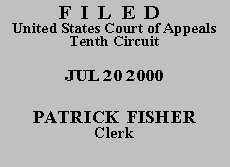

Plaintiff Larry D. Milburn appeals the district court's dismissal of his action brought under 42 U.S.C. § 1983 for due process violations. We exercise jurisdiction pursuant to 28 U.S.C. § 1291 and affirm.
Milburn was incarcerated at the El Dorado Correctional Facility in El Dorado, Kansas, when he had a tooth extracted. Milburn claims prison officials told him he could keep the gold cap from the extracted tooth, but the cap was disposed of as biohazardous material. Milburn filed a "Property Damage/Loss or Personal Injury Claim Form" for the cap. The warden denied the claim, concluding universal sanitation procedures were followed in destroying the cap. Milburn then filed a grievance with the Kansas Department of Corrections. The warden concluded Milburn's complaint was not a grievable issue under K.A.R. 44-15-101a, because that procedure is not a substitute for the property loss claims procedure. Milburn then filed a "Personal Injury or Property Damage Claim Form" with the Joint Committee on Special Claims against the State. Following a hearing and committee discussion, the Committee denied Milburn's claim.
On December 6, 1999, Milburn filed a complaint under 42 U.S.C. § 1983, alleging his Fourteenth Amendment due process rights were violated when prison officials destroyed his personal property. The district court dismissed Milburn's complaint for failure to state a claim, concluding "the Fourteenth Amendment does not protect an inmate from prison officials depriving an inmate of property, only that such deprivation afford the inmate due process." Order of Apr. 26, 2000, at 1. The district court concluded Milburn received adequate post-deprivation procedures. The district court noted that to the extent Milburn's claim could be construed as a tort claim of negligent deprivation of property, his remedy was in state court.
Milburn contends the district court erred in dismissing his complaint. We review the district court's dismissal of a complaint for failure to state a claim under 28 U.S.C. § 1915(e)(2)(B)(ii) de novo. Perkins v. Kansas Dep't of Corrections, 165 F.3d 803, 806 (10th Cir. 1999).
Kansas law provides the procedure that inmates must follow when making claims for property loss or damage. K.A.R. 44-16-104; see also K.A.R. 44-15-101a(d)(1)(B)(2) (providing procedure for inmate to challenge property loss claim procedure as improperly conducted). The Supreme Court has held that the destruction of personal property by the state does not violate the Fourteenth Amendment when the state provides an adequate post-deprivation remedy. Hudson v. Palmer, 468 U.S. 517, 536 (1984); see Durre v. Dempsey, 869 F.2d 543, 546 (10th Cir. 1989). Milburn does not claim the deprivation was caused by an established state procedure. See Logan v. Zimmerman Brush Co., 455 U.S. 422, 435-36 (1982) (concluding post-deprivation procedures not sufficient where deprivation results from established state procedure), Gillihan v. Shillinger, 872 F.2d 935, 939-40 (10th Cir. 1989). Kansas law provided an adequate post-deprivation remedy through its property loss claim procedures. The district court did not err in concluding Milburn failed to state a claim under § 1983 for a Fourteenth Amendment due process violation.
Milburn also argues the district court erred in citing Hewitt v. Helms, 459 U.S. 460 (1983), because Hewitt does not relate to the due process issues raised in his complaint. The district court cited Hewitt in denying Milburn's request for an injunction requiring the facility to establish a procedure for disposing of or returning dental gold, not as related to the merits of his due process claim. We conclude Milburn has shown no error.
The judgment of the district court is AFFIRMED. We remind Milburn of his continuing obligation to make payments on his filing fee until the entire fee has been paid. The mandate shall issue forthwith.
Entered for the Court
Mary Beck Briscoe
Circuit Judge
*.This order and judgment is not binding precedent, except under the doctrines of law of the case, res judicata, and collateral estoppel. The court generally disfavors the citation of orders and judgments; nevertheless, an order and judgment may be cited under the terms and conditions of 10th Cir. R. 36.3.